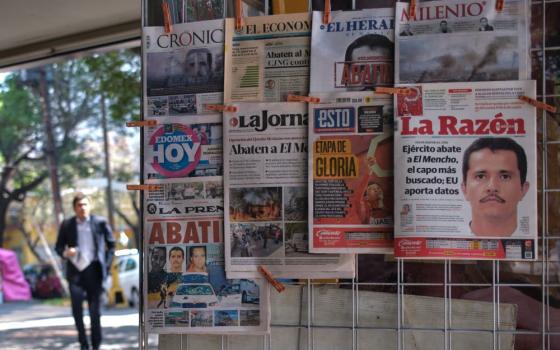Relatives of a 31-year-old man who died after contracting COVID-19 pray after his funeral June 21 at a cemetery provided by the government for victims of the virus in Jakarta, Indonesia. (CNS/Reuters/Ajeng Dinar Ulfiana)
In recent days, I have had to fight the urge to curl up into a little ball in a cabin somewhere in nature and ignore the world. I seem to be going around life in a permanent state of incredulity, and I wonder whether anyone shares this sentiment.
As an immigrant with most of my family and friends in Kenya, I exist in dual realities. Many countries in the Southern Hemisphere are disintegrating at different rates. Multiple factors are responsible for this, including but not limited to poor governance and corruption, insufficient health resources in the face of COVID-19, rising unemployment resulting in poverty and more crime. This is the everyday reality for my loved ones, and by extension, it is part of my reality.
It is hard to fully celebrate the increasing ability to navigate American society freely because of vaccine availability and access when some countries will be stuck in a seemingly endless nightmare during lockdown periods, which could last years. Experts have already started mapping the long-term consequences of the shutdown, and the impact is devastating even in a developed country after one year. What does it mean for countries with lower gross domestic products who will be in various modes of shutdown for much longer?
Advertisement
The impact must be viewed through the lens of what that means to individuals, families, communities and entire countries. There has been an increase in mental and emotional health issues, increased incidences of intimate partner abuse, a rise in homelessness and more gun violence amid a slew of other challenges.
Vaccine inaccessibility has been driven by the greed of powerful and rich nations that outbid each other in ordering the vaccines, but even more appalling is that after outbidding poorer countries, they ordered vaccines in much larger quantities than the populations of their countries. Poorer nations such as Kenya and a host of other African countries could only access the AstraZeneca vaccine under the COVAX arrangement, and that vaccine's efficacy is much lower than those from Pfizer and Moderna.
Various countries are requiring proof of vaccination or imposing stringent requirements to grant access to travelers and delineate which vaccines they find acceptable, further disadvantaging countries from the global South. This move is being termed "vaccine apartheid" because these rules seem to be imposed arbitrarily. Western countries that have had more cases of deadlier strains of COVID-19 are not subjected to these rigorous measures. People from the Southern Hemisphere already face insurmountable challenges in accessing global travel compared to people from other nations, and now, a new one has been created.
A pack of AstraZeneca COVID-19 vaccines arrive at the international airport in Accra, Ghana, in February. Ghana was the first country to receive vaccines under the global COVAX partnership. (CNS/Reuters/Francis Kokoroko)
In the midst of all these challenges, reports of copious amounts of excess vaccine doses being destroyed appear on our news feeds. The other day, I even saw that some zoo animals are getting an experimental vaccine. (I have nothing against the animals, although I struggle to see animals used to wide-open vistas caged and far from their natural habitats.) How do we grapple with more than half the world's population remaining unvaccinated? What do high-GDP countries owe their less-wealthy counterparts, given the long history of exploitation and the strong-arm tactics that the International Monetary Fund and World Bank impose camouflaged as developmental aid?
As all this goes on, we have been kept informed by the media of two men's scramble to be the first non-astronauts in space, pet projects that have cost obscene amounts of money. Is there a moral justification for the existence of multibillionaires in our world? Gaining such wealth is not just a matter of brains and grit, but a result of profiteering off people's suffering, exploiting gray areas in various laws, and white supremacy and patriarchy.
Defenders of these space exploration trips have described them as pioneering missions that might further enhance humanity's existence and future. However, even if a way were found to make life on another planet possible, history has demonstrated time and time again that already-marginalized communities would be left behind, fending for themselves on this planet that is already groaning from our exploitation.
From March 2020 to March 2021, Jeff Bezos' fortune increased from $113 billion to $178 billion. He is the first person in history worth more than $200 billion, and this happened as the majority of the world struggled to access their basic needs. How much has his — and his cronies' — wealth creation and recent space trip contributed to global warming, to a whole new swath of the working poor? Living in outer space is not an altruistic act aimed at saving our world and all its living creatures, but a way to further distance the richest 1% from the hoi polloi.
My loved ones in Kenya tell me of a dismal rainy season, which heralds food scarcity in the near future. They are experiencing unprecedented low temperatures and the biting cold as they report more COVID-19 deaths. They are exhausted by invitations to multiple fundraisers to pay for the ICU hospitalizations of family, friends and colleagues, and they have had to downsize and reprioritize even the most essential things because of unemployment and very poor returns on business.
We see South Africa wracked by COVID-19 but also by recent unrest; across the water from the coast of Florida, Cubans are demanding their rights. The list of suffering is endless, and most boils down to an inability by the world's majority to access the most basic of human needs. What will ignite the consciousness of Bezos, Richard Branson, Elon Musk, Mark Zuckerberg, Aliko Dangote, Bill Gates and all the other billionaires who can ensure that all of humanity can access their basic needs and still remain the richest men in the history of the world?
So, I will occasionally shut out the world to replenish my soul; however, the call of discipleship mandates me, mandates us, to continue calling out social inequities and holding each other accountable.






